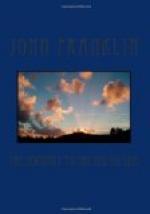learned that they had come unawares upon the Esquimaux
party, which consisted of six men with their women
and children, who were travelling towards the rapid
with a considerable number of dogs carrying their
baggage. The women hid themselves on the first
alarm, but the men advanced and, stopping at some
distance from our men, began to dance in a circle,
tossing up their hands in the air and accompanying
their motions with much shouting, to signify I conceive
their desire of peace. Our men saluted them by
pulling off their hats and making bows, but neither
party was willing to approach the other, and at length
the Esquimaux retired to the hill from whence they
had descended when first seen. We proceeded in
the hope of gaining an interview with them but lest
our appearance in a body should alarm them we advanced
in a long line, at the head of which was Augustus.
We were led to their baggage, which they had deserted,
by the howling of the dogs, and on the summit of a
hill we found lying behind a stone an old man who
was too infirm to effect his escape with the rest.
He was much terrified when Augustus advanced and probably
expected immediate death but, that the fatal blow might
not be unrevenged, he seized his spear and made a
thrust with it at his supposed enemy. Augustus
however easily repressed the feeble effort and soon
calmed his fears by presenting him with some pieces
of iron and assuring him of his friendly intentions.
Dr. Richardson and I then joined them and, after receiving
our presents, the old man was quite composed and became
communicative. His dialect differed from that
used by Augustus but they understood each other tolerably
well.
It appeared that his party consisted of eight men
and their families who were returning from a hunting
excursion with dried meat. After being told who
we were he said that he had heard of white people from
different parties of his nation which resided on the
sea-coast to the eastward and, to our inquiries respecting
the provision and fuel we might expect to get on our
voyage, he informed us that the reindeer frequent the
coast during the summer, the fish are plentiful at
the mouths of the rivers, the seals are abundant,
but there are no sea-horses nor whales, although he
remembered one of the latter, which had been killed
by some distant tribe, having been driven on shore
on his part of the coast by a gale of wind. That
musk-oxen were to be found a little distance up the
rivers, and that we should get driftwood along the
shore. He had no knowledge of the coast to the
eastward beyond the next river, which he called Nappaarktoktowock,
or Tree River. The old man, contrary to the Indian
practice, asked each of our names and, in reply to
a similar question on our part, said his name was
Terregannoeuck, or the White Fox, and that his tribe
denominated themselves Naggeooktormoeoot, or Deer-Horn
Esquimaux. They usually frequent the Bloody Fall
during this and the following moons for the purpose
of salting salmon, and then retire to a river which
flows into the sea a short way to the westward (since
denominated Richardson’s River) and pass the
winter in snow-houses.




